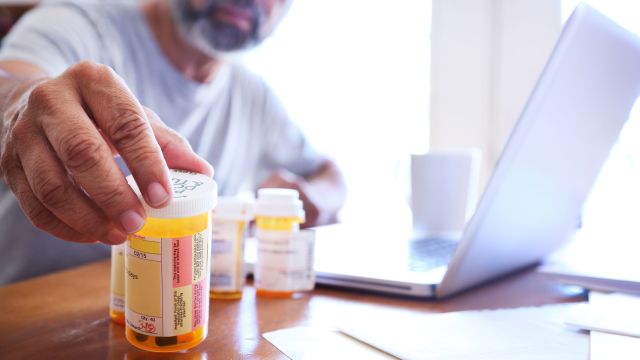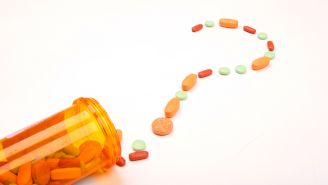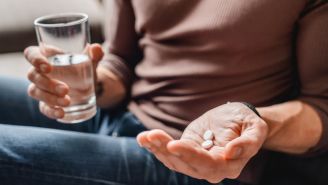Think of the name of an aspirin brand you know. If you thought “Bayer,” you’re probably not alone. But what about the store-brand aspirin that often sits side-by-side with name-brand options on the drugstore shelf? You may be wondering if they’re the same.
The short answer to that question is yes.
If a chemist analyzed pills from the two bottles, the results would match up. They’d both contain acetylsalicylic acid—the active ingredient in aspirin—at the same dose. There might be some differences in inactive ingredients, but these wouldn’t have any effect on how the medicine works.
The main difference is in the price: The generic or store-brand version will usually be much cheaper than the name brand.
One study published in 2016 in the Journal of Pharmaceutical Policy and Practice suggests that pharmacists see these options as directly interchangeable—so much so, in fact, that when it comes to over-the-counter medications, more than 90 percent of the time, they’ll pick the generic over the brand for themselves.
Why are they cheaper?
You may be wondering if “cheaper” means “not as good.” Here’s why generics tend to be less expensive.
By the time a generic drug hits the pharmacy shelves, the brand version has been around for years. The company that gained approval for the brand-name drug put in years of costly research, testing it in increasingly strict clinical trials. This groundwork and the expense of seeking approval for a new drug increase the costs of brand-name drugs.
A generic doesn’t have to go through this process of proving a drug’s safety and effectiveness. The active ingredient and how it’s formulated have already been tested and approved.
That doesn’t mean that generics have no regulation, though. Their manufacturers have to go through their own approval process, showing that their active ingredient and effects are exactly like those of the brand name in everything but name only.
Meanwhile, because several generic manufacturers typically receive approval to sell the same generic drug, the competition between those companies often has the effect of lowering the generic cost further.
Are generics regulated like brand name drugs?
The U.S. Food and Drug Administration (FDA) has specific requirements for generic drugs. They have to match up with the name-brand versions in several ways. The dose size, how it’s taken, dosage level, reasons for use, shelf life and safety all have to be the same. The medicine, says the FDA, has to work just like the brand-name drug does and it has to offer the same clinical benefits.
These requirements are crucial because, according to the FDA, 9 in 10 drug prescriptions that are filled are for generics. So it’s vital for consumers that they get what they’re supposed to get.
The FDA cautions that any batch of drugs, branded or not, can show some “natural variability.” From batch to batch, little things can change that don’t alter the medical outcome of taking the drug. The FDA has limits on just how much these factors, such as size or purity, can vary.
The process seems to work. One large study published in 2009 in the journal Annals of Pharmacotherapy looked at 12 years of data covering 2,070 studies that compared generic and branded drugs. The authors found no impressive differences between generic and branded drugs in how people absorbed them in their bodies, which is an important factor in how well a drug works.
These comparisons of how the body absorbs the generic and brand versions of a drug are known as “bioequivalence studies.” Generics can be compared to brand-name versions in other ways. They can be compared for “pharmaceutical equivalence,” which means how well they match for active ingredient, dose and how they’re administered.
Together, bioequivalence (how similarly the body uses the two comparison drugs) and pharmaceutical equivalence (how similar the active ingredient is between the drugs) add up to the “therapeutic equivalence.” A generic drug that is therapeutically equivalent to its brand-name counterpart will show pharmaceutical equivalence and bioequivalence with it. It will have the same effect and same safety profile as the brand-name drug. FDA-approved generic drugs are expected to show this therapeutic equivalence.
Why doesn’t the generic look like my drug?
One way that branded and generic versions of a drug will definitely differ is in their appearance. Legal rules call for the color or shape of the medications to be different. The active ingredient, however, must be the same.
Are there ever mistakes?
Like brand-name drugs, generic drugs are monitored on an ongoing basis. The FDA keeps an eye on everything from how a drug is made and packaged to any reports of problems from people taking the drugs.
This post-approval monitoring has helped the agency identify cases in which a generic violates the requirement of therapeutic equivalence. One such example is with an antidepressant called bupropion, also known by the brand name Wellbutrin. After a generic version of this drug was approved, some concerning reports started coming in. People were saying that one specific dose and type of the generic version was not having the usual effects of the drug.
The FDA became concerned enough to conduct its own study of how the body used the two versions of the drug. They found that one of the generics from one of several manufacturers was not therapeutically equivalent to the brand-name version. The manufacturer voluntarily pulled that generic from the market.
Is my drug available as a generic?
Although an FDA-approved generic drug is anticipated to be functionally the same as a brand-name drug, it’s still important to consult with your doctor before switching the manufacturer of any drugs you’re taking, such as from a brand-name drug to a generic.
Once you get the green light from your healthcare provider, your pharmacist will be able to help you determine whether your drug is available as a generic. You also can search on the FDA’s site through its “Orange Book” database or its Drugs@FDA tool. A search on the drug you’re looking for will list the manufacturers of the brand name and any generics that are therapeutic equivalents.






